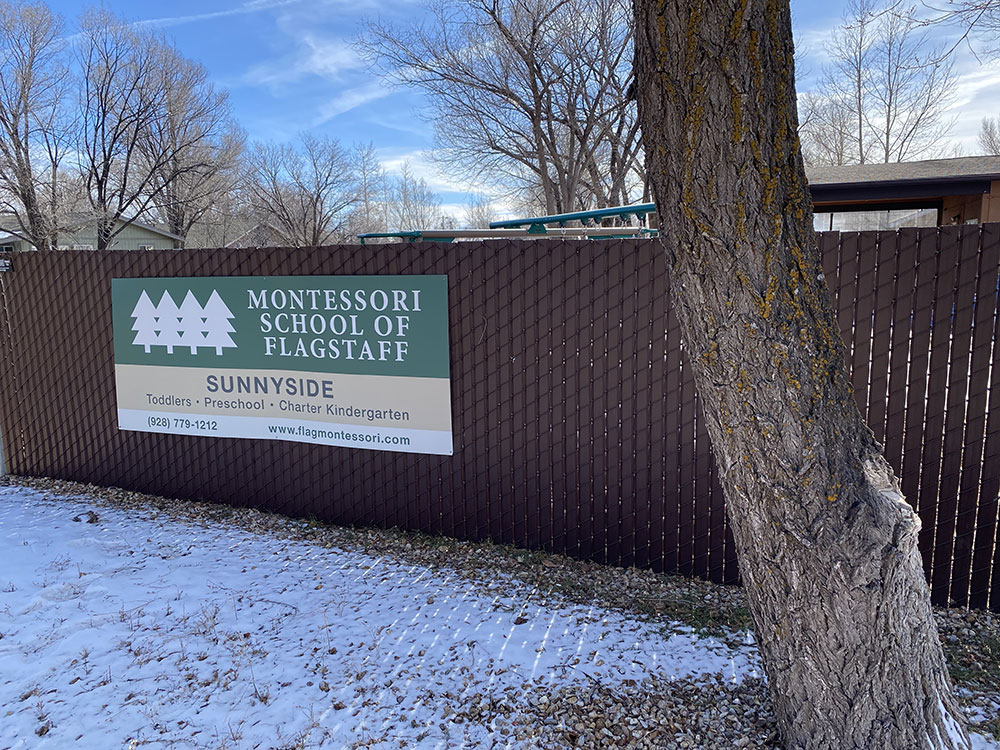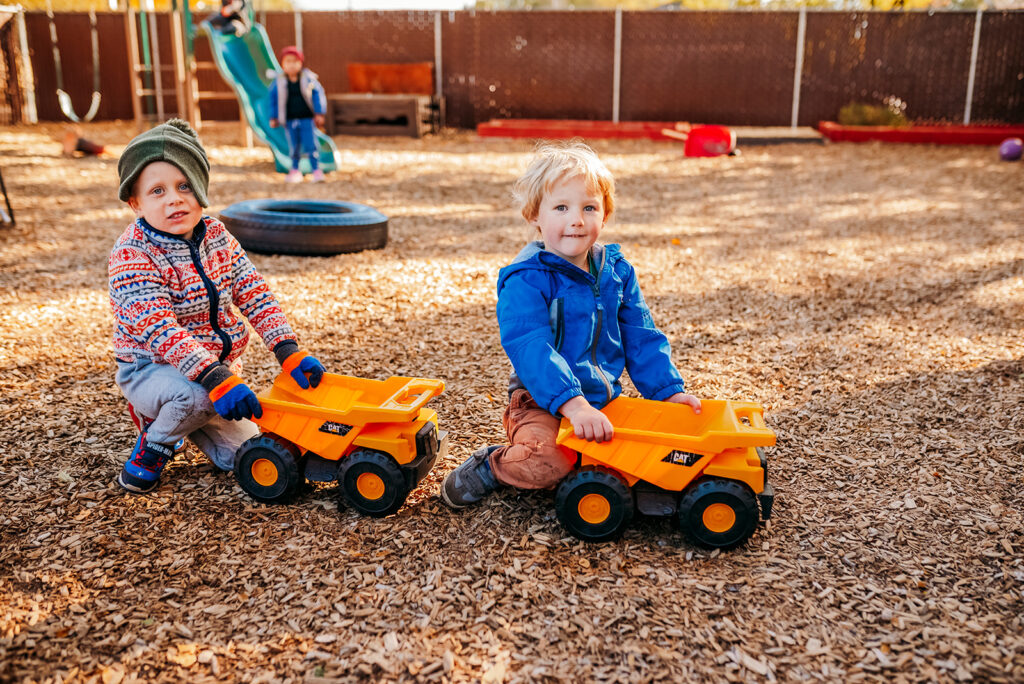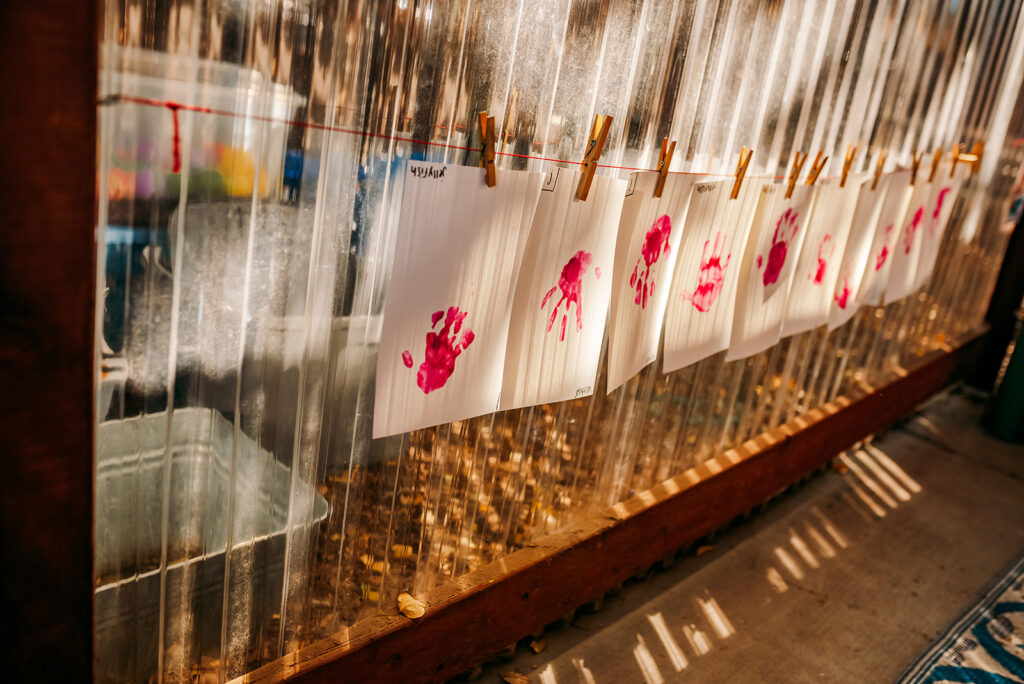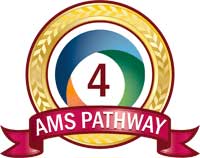Montessori Young Children, Preschool, and Kindergarten
Sunnyside Campus (18 months - K)

Who We Are
Montessori School of Flagstaff’s Sunnyside campus nurtures and supports your child’s natural curiosity from toddlerhood through preschool and Kindergarten. Each student follows a unique and personalized learning plan designed by our faculty.
Reach out to schedule a tour today!
Young Children’s Community (18 months - 3 yrs)
Our Montessori education begins at a very young age. The small, nurturing setting supports students’ natural curiosity to explore and interact with the world around them. The classroom is designed to mimic the warm and comfortable setting of home life.
The Montessori toddler program is designed to address their gregarious nature and meet their needs for exploration, order, exactness, communication, movement, concentration, repetition, productive work, imitation, independence, and self-control.
The Morning Work Cycle
Each morning, the children are greeted by their teachers and peers, and encouraged to do for themselves: hang up their jacket and backpack, wash their hands, and enter the classroom.
Students begin their day with the traditional Montessori work cycle, during which they move about the classroom, choosing lessons from a variety of areas: practical life, art, sensorial, language, movement, culture, music and math. Morning snack time is woven into the work cycle.
Circle Time
The music box plays to call the children to circle time, when children sing, participate in movement activities, and hear short lessons on such topics as the rainforest, baby animals, the seasons, weather, the human body, and nutrition.
The Outdoor Environment
After circle time, the children enjoy recess in our playground areas. Sand and water tables provide hands-on sensory experiences, while swings, climbing structures, wheeled vehicles, and balls offer opportunities for practice with gross motor and coordination skills. The students also enjoy helping maintain their gardens. Lunch time, nap time and dismissal follow.
Note that children in this class do not have to be potty-trained. Toilet learning and care of self is a major component of the toddler curriculum and teachers work with parents to make this a success. As the child approaches 3 years old and is fully potty-trained, the transition to the Primary Program begins.
Primary (3yrs-K)
The Primary Program, also called the Children’s House in the Montessori philosophy, is based on the philosophy that young children flourish with gentle guidance and the opportunity to work at their own pace.
Dr. Montessori recognized that children have sensitive periods to absorb certain information. This is the time to fill their experiences with rich language and manipulative lessons. The brain is connected to the work of the hands.
Children's House Areas of Focus
There are five distinct areas that allow the child to grow physically, mentally, and spiritually, developing their character as well as their academic interests.
Practical Life
These activities make up the foundation of the program. They help the child adapt to the environment. Practical Life skills encourage the development of a sense of order and logical thinking, as well as attention to detail, concentration, and the coordination of movement leading to self-control and independence.
Sensorial
The Montessori materials are designed to order, relate, classify, explore and realize impressions that the child has already formed. The materials help the child experience differentiations within the five senses and form the groundwork for future academic learning.
Mathematics
Dr. Maria Montessori designed “hands-on” materials to help the child investigate, calculate, measure, imagine and create. Eventually this leads the child from manipulation of the concrete to abstract thought.
Language
Language is woven into all parts of the curriculum. It begins with conversation, then explores sounds and the blending of sounds, and leads to reading, writing, and the function of words.
Cultural
This area of exploration includes world geography, physical science, zoology, biology, botany, history, art, and music studies.
To complement the richness of the classroom experience, “going out” excursions are part of the kindergarten curriculum. Also included is a variety of resource visitors to the classroom, some four-footed and furry from the animal kingdom; some human specialists in their respective fields.
Enrichment Programs

After-School Programs
To meet the needs of working parents, we offer an after-school program designed for children 18 months through kindergarten.
During the afterschool program, children enjoy crafts, games, and creative activities, as well as ample outdoor play. Additional classes such as dance, music, and soccer are also offered at an additional cost.
Summer Program
Our summer program is held in sessions during the summer months at the Sunnyside Campus for children ages 18 months–6 years. The Montessori curriculum continues with more emphasis on outdoor activities, cooking, drama, art, and music.



And so we discovered that education is not something which the teacher does, but that it is a natural process which develops spontaneously in the human being. It is not acquired by listening to words, but in virtue of experiences in which the child acts on his environment. The teacher’s task is not to talk, but to prepare and arrange . . . a special environment made for the child.
—Dr. Montessori, The Absorbent Mind
American Montessori Society
As an American Montessori Society affiliate, we are nonsectarian, family-oriented, and we build close working relationships among our students, parents, staff, and community members. In addition to our tuition-free charter school (kindergarten, elementary, and middle school), we also offer tuition-based preschool, after school, and summer programs.
The American Montessori Society’s Pathway of Continuous School Improvement is a school-quality initiative available to every AMS member school that helps schools demonstrate and articulate their commitment to quality Montessori education.


American Montessori Society
As an American Montessori Society affiliate, we are nonsectarian, family-oriented, and we build close working relationships among our students, parents, staff, and community members. In addition to our tuition-free charter school (kindergarten, elementary, and middle school), we also offer tuition-based preschool, after school, and summer programs.
The American Montessori Society’s Pathway of Continuous School Improvement is a school-quality initiative available to every AMS member school that helps schools demonstrate and articulate their commitment to quality Montessori education.
